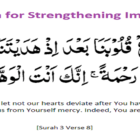Is Depression A Sign Of Weak Iman | In The Light Of Quran And Hadith
‘Depression is the sign of weak faith (Iman)’ or ‘A strong Muslim is never depressed’ is something which we Muslims have heard many times.
Many Muslims mistakenly believe that depression is a sign of weak Iman.
The argument goes as follows: Having a strong Iman means having belief in qadr and in Allah’s mercy, and the fact that everything goes according to Allah’s plans. It also entails having hope in Allah.
On the other hand, being depressed is a sign of hopelessness, losing faith in qadr and in Allah’s mercy, and therefore it is a sign of weak Iman.
In other words, only those who have weak iman will ever get depressed, and no true Muslim will therefore suffer from depression.
When a person has depression or anxiety, he/she already has done through an incident which triggered the depression. The person feels extreme sadness, to the extent of not enjoying even his own hobbies; then someone shows up in his circle, or on the internet, who tells him ‘Depression is a sign of weak Iman’, pushing the person into thinking that he actually has weak Iman, hence is being affected with negative thoughts.
People add guilt, to his depression, which ultimately results in more depression. The person starts assuming that God is angry at him, when in reality, no one knows what God thinks about a person; all are assumptions.
The person tries to patch up with God and make things right, and while doing so might even change his daily routine and activities at a time when he needed to calm and relax. Change of routines might give good results when the change is smooth and gradual, making someone do things immediately which he doesn’t like, aggravates the depression.
And during this whole process, that person never realizes that the all of this is just a construct in his own mind, there is no proof as to whether he has weak Iman or God is angry at him.
The point to ponder is that treating depression as a religious condition rather than a medical one, distracts the attention from the medical aspect which is the real problem.
What is the religious understanding that we usually follow when someone has a fracture? We seek medical help and pray meanwhile, but we don’t use that prayer as an alternative to medical treatment. We pray so that whatever is not in our control (luck) may turn out to be in our favor. Take the fracture as an example, we pray that on our way to the hospital, there is no traffic jam or that the amount of damage should be minimal.
Only if we treated mental health problems the same way, many people would have faced the situation in an easier way.
Now lets analyze whether depression is a sign of weak Iman or not. For this to be true, the simplest example would be the lives of the Prophets and Companions because everyone will agree that they didn’t have weak Iman.
There are several examples; take Yaqoob (AS), all of us read from our religious texts that he cried for years on being separated from his son until he lost his sight. Yaqoob (AS) was the son of a Prophet and the father of a Prophet, who would believe that he had weak Iman?
When Prophet Muhammad (AS) received the first revelation, he came back to his home in a state of worry and his wife Khadija (RA) helped him calm.
During migration, Abu Bakr (RA) was worried in the cave to which the Prophet (AS) said ‘Allah is with us’.
There is another incident when Abdullah Ibn Umar (RA) was in Aiteqaf (seclusion in the Masjid). A man walked in with expression of grief on his face
Ibn Umar (RA) inquired about what was the problem to which the person replied that he had debts to pay, and that day was the last day to pay back and he has nothing to pay back.
Instead of pointing out a ‘weak faith problem’ or ‘just pray’ solution, Ibn Umar (RA) said, ‘Would you like me to go and talk to the person you took loan from?’ So the man said that he’d love to do that. While leaving the Masjid, someone reminded Ibn Umar (RA) that he is in the state of Aiteqaf.
Ibn Umar (RA) said ‘Be quite, I have heard Prophet Muhammad (PBUH) say “To walk with you brother to get something done for him, it is better for you than being in the Masjid as a guest of Allah for 10 years together” ‘
In all these incidents, no where do we find such a reaction that ‘depression is a sign of weak Iman’ .
Our behavior towards people with depression has made it difficult for them to express that they are depressed.
Instead of making people feel bad about themselves, we should rather help them ease so that they go through the grief process smoothly, that way it will end soon.
It is time we should learn to address mental health issues as a medical condition and refrain from defining the religious thought the way we like, after all, none of us knows the level of someone’s Iman, and how God sees that person.
An incredible story from the Qur’an
The famous story of Ya’qub (AS) is an interesting one to explore in this context.
Prophet Ya’qub lost his beloved son Yusuf (AS) when the latter was just a boy.
Years later, he lost another son, Benyamin, in the exact same way, which not just added to his sorrow, but also triggered the old pain of losing Yusuf as well.
Reflect on what Ya’qub must have felt when he said the following:
وَتَوَلَّىٰ عَنْهُمْ وَقَالَ يَا أَسَفَىٰ عَلَىٰ يُوسُفَ وَابْيَضَّتْ عَيْنَاهُ مِنَ الْحُزْنِ فَهُوَ كَظِيمٌ
And he turned away from them and said, ‘Oh, my sorrow over Joseph,’ and his eyes became white from grief, for he was [of that] a suppressor. [12:84]
“Ya Asafa” is a lament, a heart-wringing cry for Yusuf. And we learn in this surah that Ya’qub (AS) became blind from grief!
If we were to hold the assertion that depression and “going overboard” in sadness are a sign of “weak iman”, it would be hard to square with this story. How can one dare to accuse a prophet of Allah of having weak iman? Then how come he became so miserable that he lost his eyesight?
His sons then told him:
قَالُوا تَاللَّهِ تَفْتَأُ تَذْكُرُ يُوسُفَ حَتَّىٰ تَكُونَ حَرَضًا أَوْ تَكُونَ مِنَ الْهَالِكِينَ
They said, ‘By Allah , you will not cease remembering Joseph until you become fatally ill or become of those who perish.’ [12:85]
His reply is the ultimate proof of his tawakkul, his belief in Allah and the strength of his iman:
قَالَ إِنَّمَا أَشْكُو بَثِّي وَحُزْنِي إِلَى اللَّهِ وَأَعْلَمُ مِنَ اللَّهِ مَا لَا تَعْلَمُونَ
He said, ‘I only complain of my suffering and my grief to Allah , and I know from Allah that which you do not know. O my sons, go and find out about Joseph and his brother and despair not of relief from Allah . Indeed, no one despairs of relief from Allah except the disbelieving people.’ [12:86-87]
We learn from this surah that even deep, prolonged sadness (that manifests itself in physical effects, no less!) is not contradictory to rock-solid iman in Allah.
And when we combine this with an understanding of such parables from the Qur’an, it becomes abundantly clear that sadness, feeling down, etc can often be the results of very difficult circumstances, and are not a sign that a person does not have strong belief in Allah.
More: Life Of Muslim | Muslim Life | Muslim News | Islam News | Quran | Hadith










